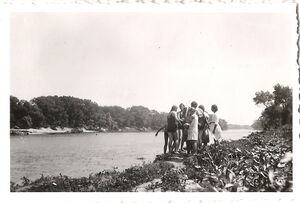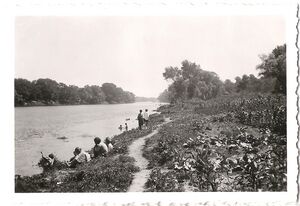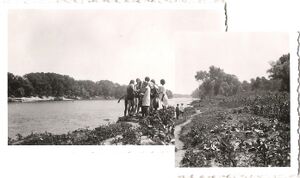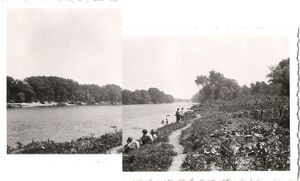1942/Juli/8/en: Unterschied zwischen den Versionen
| (3 dazwischenliegende Versionen desselben Benutzers werden nicht angezeigt) | |||
| Zeile 3: | Zeile 3: | ||
{{Geomilinfo2 | {{Geomilinfo2 | ||
| | | | ||
| − | | 8 | + | | 8<ref>this date is given by [[w:Fall_Blau#Erste_Phase|German Wikipedia]] only</ref>: [[w:en:Case_Blue#Opening_phase|Operation Braunschweig]] |
| + | | 12: XXXXIV. A.K. again<ref>acc. to KTB HGr A ([https://wwii.germandocsinrussia.org/de/nodes/5077#page/61/mode/inspect/zoom/6 TsAMO]) only today, acc. to KTB 257. I.D., NARA T-315 Roll 1804 Frame 000742/902 already since 3 June, cf. [[1942/Mai/29/en#cite_note-2|this footnote]]</ref> | | ||
| + | | 14: {{red|IV AK/[http://www.lexikon-der-wehrmacht.de/Gliederungen/Korps/IVKorps.htm Gr von Schwedler]?}} | | ||
| | | | | | ||
| − | + | | 9: Renamed [http://www.lexikon-der-wehrmacht.de/Gliederungen/Heeresgruppen/HeeresgruppeA-R.htm HGr A]<ref>KTB HGr A ([https://wwii.germandocsinrussia.org/de/nodes/5077#page/34/mode/inspect/zoom/4 TsAMO])</ref> | | |
| − | |||
| − | | 9 | ||
}} | }} | ||
| − | + | One day glad tidings reach us: The '''German offensive''' rolls on!<ref>Fridericus II (?) from 22 June 1942 (KTB 257. I.D., NARA T-315 Roll 1804 Frame 000912), here according to the sequence rather Blau/Braunschweig from 8 July</ref> Upstream German divisions have crossed the Donets and ''the [[wen:Oskol_(river)|Oskol]]''<ref>not this, initially, as attack goes north; in the original erroneously {{straight|“the {{wen|Oka}}”}}</ref> and are pushing east. Now our Ivans over there have the enemy in their flank too. The effects of this are coming. For two nights now we have been hearing muffled detonations over in the large woodland village. The Ivan seems to be blasting. | |
| − | + | Suddenly, one afternoon, there is a rumble over there. Before we quite understand, it whooshes and hisses in the air, and a hail of shells thunders down on our trench and the ruins of the village. A furious surprise fire pounds on our positions. The sentries press themselves into the corner of their post. The remaining men instinctively jump into the dugouts. I, too, darted into my dugout with a messenger. There we lie, pressed flat against the ground, listening to the crashing and bursting and the dull roar of the detonations. The earth shakes and vibrates. The air pressure of the explosions makes our clothes flutter every time. What is all this shooting about? It looks like destructive fire before an attack. But in his position, the Russian would have every reason to retreat quickly. He’s probably just firing his surplus ammunition, or he wants to disguise his retreat with this raid. But I am not at peace and crawl out to observe the terrain in front of me. There’s one lying in the ditch! It’s one of my machine gunners. He’s got a splinter in his foot. With my help he drags himself into the dugout. I go out again and turn to the left. Here the post is still standing. Impacts are still crashing and tearing. Earth and pebbles click on my steel helmet. Loose sand trickles from the edges of the trench. Blackish and white-grey clouds of smoke drift over the trench, and new explosions multiply the dark smoke. Cautiously, I peer over the edge of the trench into the forefield. Like raindrops into a puddle, the shells splash onto the meadow, throwing splashing fountains of fire, smoke and earth into the air. They are artillery shells and mortar shells. There is no sign of the enemy. But the whole area up to the river lies under a dark blanket of smoke that drifts ponderously over the ground, and through the black veils of smoke I can see the dark red flashes of fire from the bursting shells. The gunpowder vapour is drawn into my nose and throat. It scratches my throat and makes me cough constantly. I crawl back into the shelter, but it is no protection against this fire, only a psychological reassurance. | |
| − | + | Suddenly the shelling stops. Immediately the men jump out of their shelters and take up positions ready to fire. But nothing moves in front. We wait. The veils of smoke disappear. We have a clear view. In the no-man’s land, everything remains quiet. It was just a surprise fire. I give my report: “Machine-gun platoon, 1 wounded.” The rifle company has one dead. A light launcher shell hit him squarely on the head, penetrated the steel helmet and shattered the head. | |
| − | + | All indications are that the Russian has disengaged. We therefore send a scouting party across the river towards the woodland village the next morning. After a few hours he returns with the report that the village has been cleared and is free of enemies. As proof, he brings four Russians and a squealing piglet. The four Ivans had been hiding when their troops left and this way had stayed behind. Now they come to us with a relieved “woyna kapoot”<ref>{{straight|Война}}, war</ref>. | |
| − | + | Now we can indeed go swimming in the Donets unhindered! In the blazing heat, this is a wonderful refreshment, which we now savour daily. We do not let ourselves be disturbed by the corpses of fallen Red Army soldiers lying around on the bank. They must have been killed in the winter battles, because they are already badly dried out. One of them is lying on the embankment with his submachine gun strapped to his back. He has his arms stretched forward in the sand and one knee drawn up. He had been hit by a German bullet while trying to escape across the ice and climb the embankment. | |
<gallery widths="300" heights="300"> | <gallery widths="300" heights="300"> | ||
| − | File:1942-07-08- KF Am Donez (l).jpg| <span class="TgbZ"></span>'' | + | File:1942-07-08- KF Am Donez (l).jpg| <span class="TgbZ"></span>''Civilians after a swim in the Donets'' |
| − | File:1942-07-08- KF Am Donez (r).jpg| <span class="TgbZ"></span>'' | + | File:1942-07-08- KF Am Donez (r).jpg| <span class="TgbZ"></span>''Swimming in the Donez'' |
| − | File:1942-07-08- KF Am Donez (Verbund 1).jpg|<span class="TgbZ"></span>'' | + | File:1942-07-08- KF Am Donez (Verbund 1).jpg|<span class="TgbZ"></span>''At the Donez (1st montage)'' |
| − | File:1942-07-08- KF Am Donez (Verbund 2).jpg|<span class="TgbZ"></span>'' | + | File:1942-07-08- KF Am Donez (Verbund 2).jpg|<span class="TgbZ"></span>''At the Donez (2nd montage)'' |
</gallery> | </gallery> | ||
Aktuelle Version vom 26. Juni 2022, 16:05 Uhr
| GEO & MIL INFO | ||||
|---|---|---|---|---|
| 8[1]: Operation Braunschweig | ||||
| 12: XXXXIV. A.K. again[2] | 14: IV AK/Gr von Schwedler? | 9: Renamed HGr A[3] | ||
One day glad tidings reach us: The German offensive rolls on![4] Upstream German divisions have crossed the Donets and the Oskol[5] and are pushing east. Now our Ivans over there have the enemy in their flank too. The effects of this are coming. For two nights now we have been hearing muffled detonations over in the large woodland village. The Ivan seems to be blasting.
Suddenly, one afternoon, there is a rumble over there. Before we quite understand, it whooshes and hisses in the air, and a hail of shells thunders down on our trench and the ruins of the village. A furious surprise fire pounds on our positions. The sentries press themselves into the corner of their post. The remaining men instinctively jump into the dugouts. I, too, darted into my dugout with a messenger. There we lie, pressed flat against the ground, listening to the crashing and bursting and the dull roar of the detonations. The earth shakes and vibrates. The air pressure of the explosions makes our clothes flutter every time. What is all this shooting about? It looks like destructive fire before an attack. But in his position, the Russian would have every reason to retreat quickly. He’s probably just firing his surplus ammunition, or he wants to disguise his retreat with this raid. But I am not at peace and crawl out to observe the terrain in front of me. There’s one lying in the ditch! It’s one of my machine gunners. He’s got a splinter in his foot. With my help he drags himself into the dugout. I go out again and turn to the left. Here the post is still standing. Impacts are still crashing and tearing. Earth and pebbles click on my steel helmet. Loose sand trickles from the edges of the trench. Blackish and white-grey clouds of smoke drift over the trench, and new explosions multiply the dark smoke. Cautiously, I peer over the edge of the trench into the forefield. Like raindrops into a puddle, the shells splash onto the meadow, throwing splashing fountains of fire, smoke and earth into the air. They are artillery shells and mortar shells. There is no sign of the enemy. But the whole area up to the river lies under a dark blanket of smoke that drifts ponderously over the ground, and through the black veils of smoke I can see the dark red flashes of fire from the bursting shells. The gunpowder vapour is drawn into my nose and throat. It scratches my throat and makes me cough constantly. I crawl back into the shelter, but it is no protection against this fire, only a psychological reassurance.
Suddenly the shelling stops. Immediately the men jump out of their shelters and take up positions ready to fire. But nothing moves in front. We wait. The veils of smoke disappear. We have a clear view. In the no-man’s land, everything remains quiet. It was just a surprise fire. I give my report: “Machine-gun platoon, 1 wounded.” The rifle company has one dead. A light launcher shell hit him squarely on the head, penetrated the steel helmet and shattered the head.
All indications are that the Russian has disengaged. We therefore send a scouting party across the river towards the woodland village the next morning. After a few hours he returns with the report that the village has been cleared and is free of enemies. As proof, he brings four Russians and a squealing piglet. The four Ivans had been hiding when their troops left and this way had stayed behind. Now they come to us with a relieved “woyna kapoot”[6].
Now we can indeed go swimming in the Donets unhindered! In the blazing heat, this is a wonderful refreshment, which we now savour daily. We do not let ourselves be disturbed by the corpses of fallen Red Army soldiers lying around on the bank. They must have been killed in the winter battles, because they are already badly dried out. One of them is lying on the embankment with his submachine gun strapped to his back. He has his arms stretched forward in the sand and one knee drawn up. He had been hit by a German bullet while trying to escape across the ice and climb the embankment.
|
Editorial 1938 1939 1940 1941 1942 1943 1944 1945 1946 1947 1948 1949 Epilog Anhang |
|
January February March April May June July August September October November December Eine Art Bilanz Gedankensplitter und Betrachtungen Personen Orte Abkürzungen Stichwort-Index Organigramme Literatur Galerie:Fotos,Karten,Dokumente |
|
1. 2. 3. 4. 5. 6. 7. 8. 9. 10. 11. 12. 13. 14. 15. 16. 17. 18. 19. 20. 21. 22. 23. 24. 25. 26. 27. 28. 29. 30. 31. Erfahrungen i.d.Gefangenschaft Bemerkungen z.russ.Mentalität Träume i.d.Gefangenschaft Personen-Index Namen,Anschriften Personal I.R.477 1940–44 Übersichtskarte (Orte,Wege) Orts-Index Vormarsch-Weg Codenamen der Operationen im Sommer 1942 Mil.Rangordnung 257.Inf.Div. MG-Komp.eines Inf.Batl. Kgf.-Lagerorganisation Kriegstagebücher Allgemeines Zu einzelnen Zeitabschnitten Linkliste Rotkreuzkarte Originalmanuskript Briefe von Kompanie-Angehörigen |
- ↑ this date is given by German Wikipedia only
- ↑ acc. to KTB HGr A (TsAMO) only today, acc. to KTB 257. I.D., NARA T-315 Roll 1804 Frame 000742/902 already since 3 June, cf. this footnote
- ↑ KTB HGr A (TsAMO)
- ↑ Fridericus II (?) from 22 June 1942 (KTB 257. I.D., NARA T-315 Roll 1804 Frame 000912), here according to the sequence rather Blau/Braunschweig from 8 July
- ↑ not this, initially, as attack goes north; in the original erroneously “the Oka”
- ↑ Война, war




